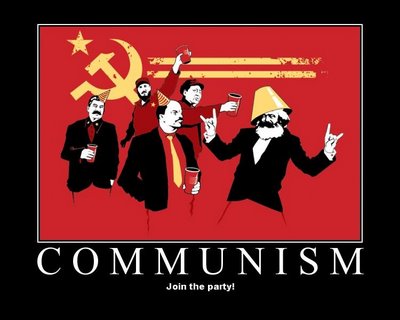 Communism
Communism: a social structure in which classes are abolished and property is commonly controlled, as well as a political philosophy and social movement that advocates and aims to create such a society.
It's not a secret that most of my friends are very, very liberal. One is even pending membership in the Socialist party. And oftentimes, we get into deep political ideology discussions, in which I hear this quite often.
"Yeah, communism is good in
theory, but not in practice."
I don't just hear this from my friends, however. This argument defending the ideology is quite common. But I have news for you: it's untrue.
Communism is neither good in theory
nor in practice, and I'm here to tell you why.
First, there's the issue of innovation being doomed to halt. I'm sure you're all aware of the dark ages. "Later historians expanded the term [Dark Ages] to refer to the transitional period between Roman times and the High Middle Ages, including not only the lack of Latin literature, but also a lack of contemporary written history, general demographic decline, limited building activity and material cultural achievements in general.
Popular culture has further expanded on the term as a vehicle to depict the Middle Ages as a time of backwardness, extending its pejorative use and expanding its scope."-
Joseph TainterHow does this relate to Communism? Patience, please. In Communism, regardless of your skill level or occupation, you are paid the same amount as everyone else. That's one of the big changes in the system to eliminate socioeconomic classes. However, all this would do is murder any kind of competitive drive that exists within workers. If there are no rewards for doing a good job or inventing something or having a better idea, then there is no reason anyone will do any of those things. Let's face it, competition creates innovation, because without some sort of reward, why bother? If we accept Communism, then we accept responsibility for creating another Dark Age, where we move backwards instead of forwards.
Second, there's the idea of complete government control. In the Communist system, the government is in charge of everything. Whatever they want, they can do. Civil rights? Forgetaboutit. The wishes of the few override the wishes and the needs of the whole, and that doesn't seem like a sound system.
I sort of see where my friends and others like them. Communism would eliminate classes, because classes are BAD! Communism gives everyone the same opportunities, and opportunities are GOOD!
Unfortunately, I have to disagree. Social classes may seem bad, but without them, again, competition wouldn't exist. People of lower classes are motivated to work hard in order to earn a position higher up, even if there's only a very low probability it will happen. And people of higher classes have earned- through their own hard work or the hard work of a family member- their status. We shouldn't punish someone for being successful. Also, although communism seems to allocate the same opportunities to everyone, it's an illusion. What communism does is chooses the opportunities it wants to afford its citizens and then limits its citizens to those few things. Capitalism affords the same opportunities to everyone, even though the success rates aren't always even, but communism limits both success
and opportunity.
As far as I can tell, there's nothing good about the idea or the practice of Communism.








